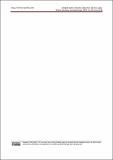Por favor, use este identificador para citar o enlazar a este item:
http://hdl.handle.net/10261/236365COMPARTIR / EXPORTAR:
 SHARE SHARE
 CORE
BASE CORE
BASE
|
|
| Visualizar otros formatos: MARC | Dublin Core | RDF | ORE | MODS | METS | DIDL | DATACITE | |

| Título: | Army forces and epidemic diseases: A travel through the xixth century international sanitary conferences |
Autor: | Wulff, Enrique CSIC ORCID | Palabras clave: | Communicable diseases Military medicine International cooperation Cholera Quarantine XIXth Century |
Fecha de publicación: | 5-jun-2020 | Editor: | Elsevier | Citación: | History of Science and Technology 10 1(16): 138-150 (2020) | Resumen: | This article involves a critical examination of XIXth century military interventions, as the basic cause of the international contagion. Challenges arising and choices made in a critical reading of the International Sanitary Conferences (ISC) proceedings, reveal case histories and early statistical techniques at use with epidemiological purposes. These episodes in the history of the diseases suggest that relevant military information was circulated among health professionals through the ISCs. Although the evolution of the epidemic process during the latter half of the XIXth century made the Conferences fail to cure the diseases that the Western medicine own expansion engendered. By discussing the ways that prophylactic measures and international interventions were used by medical scientists and diplomats alike, from the detailed records of troop mortality to such ubiquitous terms as "contagion" and "quarantine", the article seriously reflect on what happened when the action taken by military forces was a mass phenomenon. As evidenced from the study of the proceedings when comparing different populations, in the pathologies associated with the mass-transport era the rationale of interaction outlined the challenges involved in the train transport of troops. Also, the existence of an environmental risk factor can answer the question on the action taken by military forces as a mass phenomenon with huge impacts on hospitals, harbors and prisons. Materials intended for these international epidemics studies and commissions were prepared by experimented military and civil medical doctors who believed that evidence and common sense proved epidemic diseases capable of being prevented, treated, and controlled by a military approach. This essay demonstrates that Army forces' capability to take control over their host governing apparatus, emphasizes the importance of their aim to follow and accompany the control of the disease in the imperialist competition for land. It grows out of its specific historical context, which due to its origin could become uniform and international, but constituted the principal obstacle on the road to an international health office. | Versión del editor: | http://dx.doi.org/10.32703/2415-7422-2020-10-1(16)-138-150 | URI: | http://hdl.handle.net/10261/236365 | DOI: | 10.32703/2415-7422-2020-10-1(16)-138-150 | ISSN: | 2415-7430 |
| Aparece en las colecciones: | (ICMAN) Artículos |
Ficheros en este ítem:
| Fichero | Descripción | Tamaño | Formato | |
|---|---|---|---|---|
| Army_Wulff_PV_Art2020.pdf | 467,69 kB | Adobe PDF |  Visualizar/Abrir |
CORE Recommender
Page view(s)
65
checked on 18-abr-2024
Download(s)
126
checked on 18-abr-2024
Google ScholarTM
Check
Altmetric
Altmetric
Este item está licenciado bajo una Licencia Creative Commons



